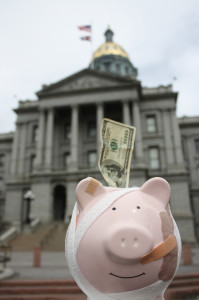Each year National Taxpayers Union (NTU) surveys statewide and local ballot initiatives, referenda and constitutional amendments facing voters across the country. Though these questions do not garner the same amount of attention as the presidential contest, they could have a profound impact on the lives of taxpayers in the Centennial State. To our surprise, Colorado might be this year’s epicenter of the fight over bigger, costlier, and more intrusive government this election cycle, as voters will weigh in on several significant ballot measures.

If approved by voters, Amendment 69 would create ColoradoCare, a government-run universal health insurance program. Exempt from Colorado’s wildly successful Taxpayer’s Bill of Rights (TABOR), ColoradoCare would double the size of the state budget and taxpayers would be stuck with a $25 billion tax bill. Increasing taxes so dramatically would be devastating for the Centennial State’s economy.
Aside from being a bad deal for taxpayers, Amendment 69 would likely lead to a less healthy Colorado by imposing government price controls on the provision of health care. Who would set prices? Amendment 69 establishes a 21 member board of trustees – unelected bureaucrats. Prior attempts by governments to set prices have failed miserably in virtually every context– leading to shortages and rationing. ColoradoCare would be no different.
![]() Amendment 70 would gradually raise the state’s minimum wage from $8.31 an hour to $12, as many other states and localities are currently debating whether to raise the minimum wage to $15 per hour. While not as aggressive as other minimum wage increases across the country, Amendment 70 is ill-conceived. The best economic research indicates the inherent trade off that comes from hiking the minimum wage: certain people will see a wage increase, but others will be priced out of the market and therefore out of a job. This has been the case in jurisdictions like Seattle, Washington where a recent minimum wage increase has reduced hours for workers and increased unemployment. While stagnating wages are a valid source of frustration for many Coloradans, with an unemployment rate well below the national average, it makes little sense to jeopardize the state’s recent economic successes by hiking the minimum wage.
Amendment 70 would gradually raise the state’s minimum wage from $8.31 an hour to $12, as many other states and localities are currently debating whether to raise the minimum wage to $15 per hour. While not as aggressive as other minimum wage increases across the country, Amendment 70 is ill-conceived. The best economic research indicates the inherent trade off that comes from hiking the minimum wage: certain people will see a wage increase, but others will be priced out of the market and therefore out of a job. This has been the case in jurisdictions like Seattle, Washington where a recent minimum wage increase has reduced hours for workers and increased unemployment. While stagnating wages are a valid source of frustration for many Coloradans, with an unemployment rate well below the national average, it makes little sense to jeopardize the state’s recent economic successes by hiking the minimum wage.
Also on the statewide ballot this fall is Amendment 72, which would raise the state’s cigarette tax from $0.84 to $2.59 per pack – a staggering 208 percent increase. An odd feature of Amendment 72 is that it would lock in $315 million in new spending into the Centennial State’s constitution. This would hamstring state budget writers who could not use this revenue even in cases of emergencies. More troubling is that the Amendment would fund programs that are not yet created. This creates an unaccountable situation – levying taxes now for undetermined future government programs. How can voters make an informed decision when they have no idea about how all the tax dollars will be spent? Finally, less than 20 percent of the revenue generated by passage of the Amendment would go toward smoking cessation programs.
At the local level, taxpayers in Boulder will vote on Measure 2H, which would institute a two cents per ounce tax on the distribution of sugar-sweetened beverages in the city. If passed, the tax would be passed along to consumers at the grocery store and restaurants. These regressive tax hike proposals have become quite the rage lately for preening public health advocates purportedly trying to curb obesity and diabetes. When asked about Philadelphia’s soda tax proposal during Pennsylvania’s Democratic primary, Senator Bernie Sanders of Vermont, typically a supporter of virtually every tax hike, opposed the measure and said, “A tax on soda and juice drinks would disproportionately increase taxes on low-income families in Philadelphia.” On top of the regressive nature of the tax, it would only apply to sugar-sweetened drinks – not other items containing sugar at the grocery store. It seems Measure 2H has little to do with encouraging healthy living and everything to do with taking more out of the pocketbooks of Boulder’s taxpayers. In short, Measure 2H is nothing more than a cash grab by spendthrift local politicians.
Fiscal folly has traditionally been the province of states on the West Coast and New England, not more responsible states like Colorado. Hopefully this year’s ballot questions are an aberration – another oddity in an incredibly bizarre and unprecedented election cycle – and do not portend the future of Colorado’s political climate.
Clark Packard is Counsel and Government Affairs Manager at National Taxpayers Union.


